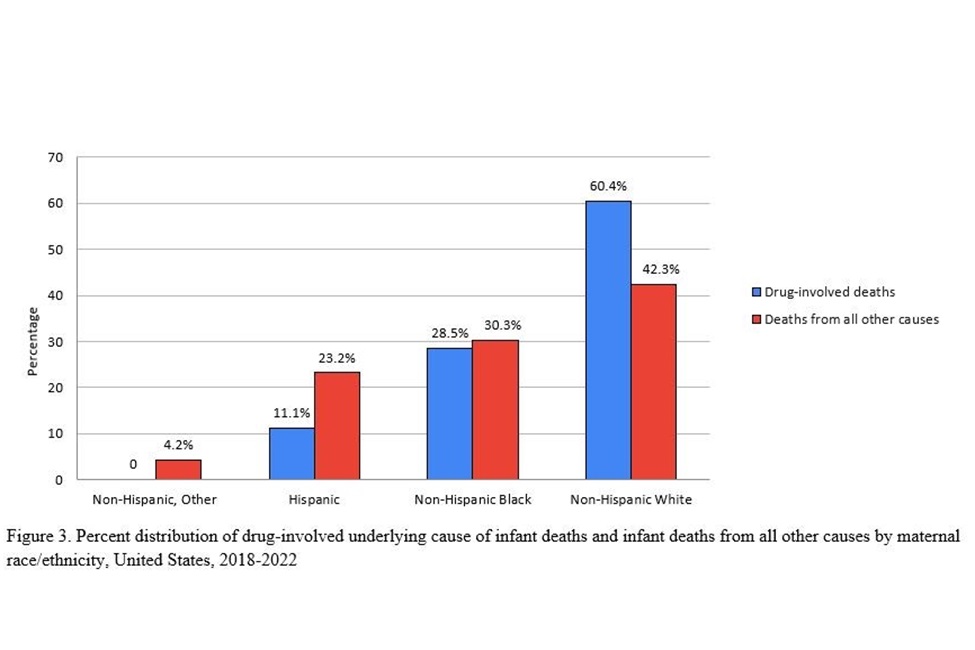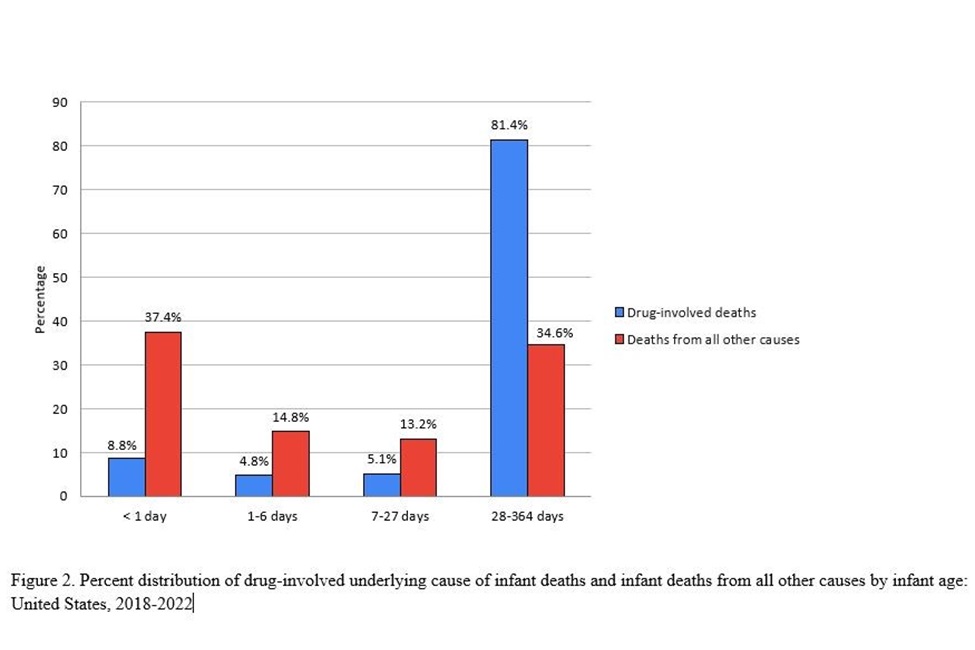U.S. Drug-related Infant Deaths More than Doubled from 2018 to 2022

(Photo by Alex Dolce)
A new study by Florida Atlantic University’s Schmidt College of Medicine has uncovered a disturbing trend in drug-related infant deaths in the United States from 2018 to 2022.
Infant deaths are those that occur between the time a child is born and age 1. Drug-involved deaths are those in which drugs are either the primary cause of death or a contributing factor and may occur due to maternal drug use, inadvertent or accidental intake of specific prescriptions, illicit or non-medical use of drugs and other incidents where drugs were linked to death.
Results of the study, published in the Journal of Perinatal Medicine, show that in the U.S. from 2018 to 2022, drug-involved infant deaths more than doubled (120% increase) from 10.8% in 2018 to 24.4% in 2022. The largest increase was observed between 2019 (16.9%) and 2022 with the greatest proportion of drug-related infant deaths occurring in 2021 (25.8%). Overall, relative to all other causes of infant mortality, drug-involved deaths became more prevalent after 2019.
Findings show that drug-involved infant deaths also were higher in the postnatal period, ages 28 to 364 days (81.4%), relative to deaths due to all other causes during the same period (34.6%). The most prevalent underlying causes of death included assault (homicide) by drugs, medicaments and biological substances (35.6%) followed by poisoning from exposure to narcotics and psychodysleptics (hallucinogens) (15.6%), and accidental poisoning from exposure to antiepileptic, sedative-hypnotic, antiparkinsonism and psychotropic drugs (10.8%). The most common multiple causes of drug-involved infant deaths were psychostimulants with abuse potential of synthetic narcotics.
In addition, a significant proportion of infants who died from drug-involved causes were born to non-Hispanic white (60.4%) and non-Hispanic Black mothers (28.5%). Furthermore, drug-induced mortality was 56.5% in male infants and 43.7% in female infants, a difference which also was statistically significant.
“The differences we observed by race/ethnicity in drug-involved deaths, predominantly among non-Hispanic white and Black infants require a multifaceted approach for clinical and public health interventions,” said Panagiota “Yiota” Kitsantas, Ph.D., corresponding author and professor and chair of the Department of Population Health and Social Medicine , FAU Schmidt College of Medicine. “Addressing the social determinants of health, enhancing access to addiction treatment and implementing culturally sensitive interventions may be important to prevent infant deaths in vulnerable populations. In addition, the underlying causes, which included drug-related assault and various forms of poisoning, also may be areas for clinical and public health interventions.”
From 2018 to 2022, drug-involved infant deaths accounted for 1.18% of all infant deaths, a notable rise from the previously reported 0.64% from 2015 to 2017. This increase was particularly pronounced during COVID-19, raising questions that require further studies. During this period, drug overdose mortality also increased substantially among pregnant and postpartum women.
The researchers note that during COVID-19 there was reduced access to prenatal care, the emergence of health care deserts and hospital closures, especially in rural areas. These may have contributed, at least in part, to the observed increases in drug-related infant deaths, although more research is warranted.
“Given the alarming increase in the number of drug overdose deaths in the general population, especially among pregnant and postpartum women, findings from our study are both important and timely,” said Maria C. Mejia, M.D., senior author and a professor of population health and social medicine, FAU Schmidt College of Medicine. “Drug-involved deaths in infants represent a potentially avoidable cause that should be considered in efforts to reduce infant mortality in the United States. Effective strategies will require collaborative efforts among health providers, public health agencies and community partners, and should focus on preventing and treating maternal substance use disorders, enhancing prenatal care access and addressing broader social and behavioral risk factors.”
For the study, researchers used data from the U.S. Centers for Disease Control and Prevention’s Wide-ranging Online Data for Epidemiologic Research (WONDER) and selected the period of 2018 to 2022 because 2018 was pre-COVID-19 and 2022 represents the most recent data available. Infant deaths were described by year of death, underlying cause and multiple cause of death, age of infant at time of death, gender and maternal race/ethnicity (non-Hispanic white, non-Hispanic Black, non-Hispanic, Hispanic and other race).
Study co-authors are Charles H. Hennekens, M.D., Dr.PH, first Sir Richard Doll Professor of Medicine and senior academic advisor; Sebastian Densley and Meera Rao, FAU medical students; Lea Sacca, Ph.D., an assistant professor in the Department of Population Health and Social Medicine; and Robert S. Levine, M.D., affiliate professor of medicine; all within FAU’s Schmidt College of Medicine.


-FAU-
Latest News Desk
- FAU Harbor Branch Announces 2025 Ocean Science Lecture SeriesFlorida Atlantic University's Harbor Branch Oceanographic Institute announced the lineup for its annual "John & Barbara Ferrera Ocean Science Lecture Series."
- FAU, Flagler Credit Union Announce Football Stadium Naming PartnershipA historic, 15-year football stadium naming partnership between Florida Atlantic University Athletics and Flagler Credit Union was approved by FAU's Board of Trustees during a special meeting today.
- FAU's Randy D. Blakely, Ph.D., Honored as a Prestigious ASPET FellowRandy D. Blakely, Ph.D., a highly regarded neuroscientist and pharmacologist, is among an extraordinary group selected by the American Society for Pharmacology and Experimental Therapeutics.
- Study Uses AI to Interpret American Sign Language in Real-timeA first-of-its-kind FAU engineering study is breaking barriers by accurately capturing complex hand gestures in sign language using computer vision.
- FAU Celebrates Fall 2024 GraduatesFlorida Atlantic University conferred more than 2,700 degrees over the course of five in-person commencement ceremonies in the Carole and Barry Kaye Performing Arts Auditorium.
- FAU Engineering Wins Esteemed JFM 'Emerging Scholar Best Paper Prize'FAU engineering researchers have won the Journal of Fluid Mechanics' 2023 "Emerging Scholar Best Paper" award, which was selected from among nearly 400 eligible papers published in the journal.






